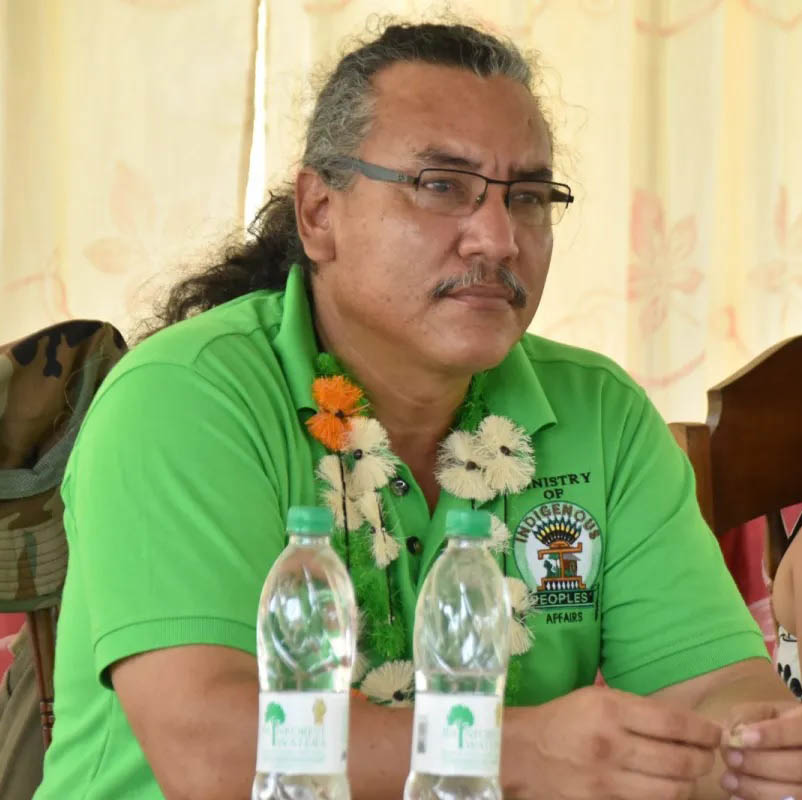At a press conference held yesterday at Congress Place, Sophia, APNU+AFC’s Mervyn Williams said that during a six-day visit to the Rupununi from March 7th, “hundreds of residents in several hinterland communities” complained that they have not been positively impacted by Guyana’s oil economy.
“Throughout the six days, we met with hundreds of residents across the hinterland and they contended that oil money is not reaching them and impacting their lives,” the PNCR Member said.
Williams said that meetings were held in the villages of Parishara, Nappi, Yupukari, Hiawa, Kaicumbay, Maruranau, Shea, Awarewaunau, Aishalton, Karau-darnau, Achawib, Meriwau, Katoonnarib, and Sawariwau in the South and Deep South Rupununi. Afterwards, the team engaged the residents of the villages of Karasabai, Tiger Pond, Paipan, Annai Central, Aranaputa, Rupertee and Surama in the North Rupununi.
“The people in the Rupununi made it clear that they are worse off under the PPP than under the APNU+AFC and contended that they enjoy better services under the APNU+AFC.”
Williams who gave several examples of the complaints of the Region Nine residents, reported that many persons said that they had requested that they receive a pension every month rather than every six months.
He said that residents of Karasabai, Tiger Pond, and Paipan complained that they have to wait six months to receive their old age pension and they told him that this situation only serves to make life harder for them
“Across the Rupununi, in every village visited, the people cried out about the unsavoury and harsh way of life they must go through daily since the return of the PPP/C government”, Williams said.
Williams said that according to the residents of Region Nine, the government’s distribution of cash grants cannot help them to elude poverty and has not contributed to the improvement of their quality of life.
Other issues raised by the aggrieved residents of Region Nine according to Williams were:
1)Land rights and the processing of land extension applications within several villages are not being addressed by the government. 2) The government discontinuing the Review and Amendment of the Amerindian Act which commenced under the APNU+AFC. 3) Many schools are extremely hot and unsafe and there is a lack of books for the Secondary Schools. This is coupled with the poor administration of Secondary Education. 4) The lack of training, leadership, entrepreneurial exposure and no support for agriculture and small business development in the region. 5) The non-access to potable water and a severe shortage of water for agricultural purposes. 6) The residents also pointed out the need for health care centres, staff along with ambulances for emergencies, and the shortage of drugs in the health system. 7) The children are falling sick in the dormitory at Aishalton as a result of poor sanitation and ventilation, coupled with the absence of qualified teachers in the sciences and a general shortage of teachers has placed Region Nine in an education crisis.
The Central Executive member also pointed out that many residents deplore the government’s poor handling of carbon credits, with residents stating that they should have been consulted instead of the administration imposing on them the percentage of income which the Indigenous People should get from these carbon credits.
According to Williams, this is disrespectful to Guyana’s First Peoples. He said that the residents posited that it is time for the government to respect the rights of the Indigenous Peoples by affording them the right to free, prior, and informed consent in relation to matters involving Indigenous communities.
Leader of the Opposition, Aubrey Norton said at the press conference that he had responded to the many concerns raised by the residents of Region Nine.
Asked if his party intends to raise these issues with Minister of Amerindian Affairs Pauline Sukhai, Norton told Stabroek News that he will continue to disseminate information regarding the woes of residents in the hinterland but having discussions with the subject minister is “a waste of time.”
“Every time we raise issues concerning Indigenous people at parliament, the minister always gives us some excuse, which of course is nonsensical.” Norton said that his party, once elected to office next year, will push for its People-Centered Development Strategy which is expected to deliver to Guyanese a better quality of life.
In outlining the Strategy, Williams said that Indigenous Peoples must have the greatest say on the issues that concern them and set out what the APNU+AFC agenda for the Indigenous Peoples would be, once elected.
1) Allow the people in the villages to make their own decisions and end political partisan control of the village leaders. 2) Remove the political partisan control over the National Toshaos Council (NTC) and allow the people to elect their leaders. 3) Increase consultation with the people to amend the Amerindian Act so that it reflects the will of the people, address environmental issues, and allow the people to develop their policies and programmes to address Indigenous concerns. 4) Govern with respect for Indigenous rights, particularly based on Free, Prior and Informed Consent, right to self-determination and land rights, among others. 5) Develop sustainable Indigenous communities that include agricultural development, agro-processing, develop competent contractors and businesspersons from all Indigenous communities and the provision of local and international training for Indigenous Peoples to make them independent and end the dependency being created by the government’s approach which is to dominate and control all aspects of their lives. 6) Develop a programme to make Indigenous languages become the vehicle of choice for education delivery in the formative years of Indigenous children and a programme for the development of Indigenous Youth Leadership and Entrepreneurship.






